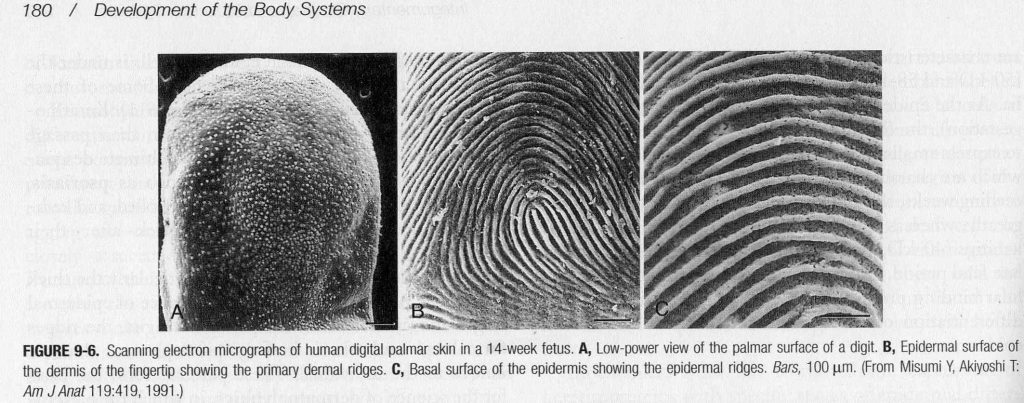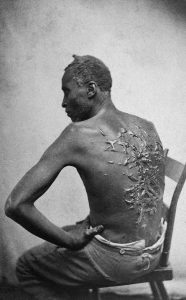“For You created my innermost parts;
You wove me in my mother’s womb.
I will give thanks to You, because I am awesomely and wonderfully made;
Wonderful are Your works,
And my soul knows it very well.”
– Psalms 139:13-14
It’s been said that if wombs had windows, abortion would be no more. Then we would be able to see with our own eyes what the Psalmist described above thousands of years ago. But ultrasonic imaging, Magnetic Resonance Imaging (MRI), and the Scanning Electron Microscope (SEM) have given us unprecedented windows into the status of the unborn human.
Today I want to highlight 2 sets of photos from Bruce Carlson’s 4th edition (2009) of “Human Embryology and Developmental Biology” textbook (pages 179-180). The lead photo above is an SEM photo of the hand (A) and foot (B) of an 8-week-old fetus. Notice the detail at only 8 weeks. That is obviously not “just a clump of cells” as abortion supporters would have you believe. The arrows point to the volar pads where epidermal ridges will start forming between 11 and 17 weeks. Oh boy… “epidermal ridges.” Well, you might know those better as … fingerprints! Yes, the fingerprint patterns that can uniquely identify you as an adult person are already discernible below the surface of the skin before the end of the first trimester. In fact, the other series of photos below, also taken with a Scanning Electron Microscope, are of the obvious loop pattern of the fingerprint of a 14-week-old fetus. The fingerprints will be visible on the surface of the skin by the end of the 5th month, but as you can see for yourself, the unique pattern is already formed far earlier.
 But now the question for you, dear reader, is what will you do with this information? We cannot live in denial of what we now see so clearly. The case for the life of the unborn is similar to the case for American slaves in
But now the question for you, dear reader, is what will you do with this information? We cannot live in denial of what we now see so clearly. The case for the life of the unborn is similar to the case for American slaves in  the 1860’s: pictures tell an undeniable story. There was a famous picture of an escaped slave, dubbed “Whipped Peter”, who escaped from a Louisiana plantation to a Union camp during the Civil War. He was photographed because of the severity of the beatings he had endured and the scarring that showed plainly the injustice of chattel slavery. That picture was reproduced and distributed to wake people up to the real horrors that had occurred. While it was easy to discuss the subject of slavery detached from the real effects of it, pictures like the one here brought the discussion home in all its gruesome messiness. Likewise, pictures have been vital for the pro-life cause from the beginning because it’s harder to whitewash the facts with euphemisms about “reproductive freedom” and “choice” when there’s a picture of a clearly dismembered human body in front of you. But now, it’s not just pictures of the effects of abortion that are available for any who dare to look at them. It’s pictures (and now video) of the baby in utero moving and kicking and sucking her thumb, doing many of the same things we love to see newborns do. The new “4D ultrasounds” are showing in unprecedented clarity and detail the humanity and personality of the unborn in real time.
the 1860’s: pictures tell an undeniable story. There was a famous picture of an escaped slave, dubbed “Whipped Peter”, who escaped from a Louisiana plantation to a Union camp during the Civil War. He was photographed because of the severity of the beatings he had endured and the scarring that showed plainly the injustice of chattel slavery. That picture was reproduced and distributed to wake people up to the real horrors that had occurred. While it was easy to discuss the subject of slavery detached from the real effects of it, pictures like the one here brought the discussion home in all its gruesome messiness. Likewise, pictures have been vital for the pro-life cause from the beginning because it’s harder to whitewash the facts with euphemisms about “reproductive freedom” and “choice” when there’s a picture of a clearly dismembered human body in front of you. But now, it’s not just pictures of the effects of abortion that are available for any who dare to look at them. It’s pictures (and now video) of the baby in utero moving and kicking and sucking her thumb, doing many of the same things we love to see newborns do. The new “4D ultrasounds” are showing in unprecedented clarity and detail the humanity and personality of the unborn in real time.
While I have serious theological disagreements with the Roman Cartholic Church, Salvatore Joseph Cordileone, Archbishop of San Francisco, recently explained very succinctly why abortion is such an important issue – “Abortion is the axe laid to the roots of the tree of human rights: when our culture encourages the violation of life at its youngest and most vulnerable condition, other ethical norms cannot stand for long.”[1] So very true. Will you stand by while the tree of human rights is chopped down? Now that you know the truth, and have seen it with your own eyes via the wonders of modern technology, can you keep silent? I know I can’t, and I hope you won’t be able to either.
[1] “Before I Formed You in the Womb I Knew You: A Pastoral Letter on the Human Dignity of the Unborn, Holy Communion, and Catholics in Public Life”, Salvatore Joseph Cordileone, May 1, 2021.

